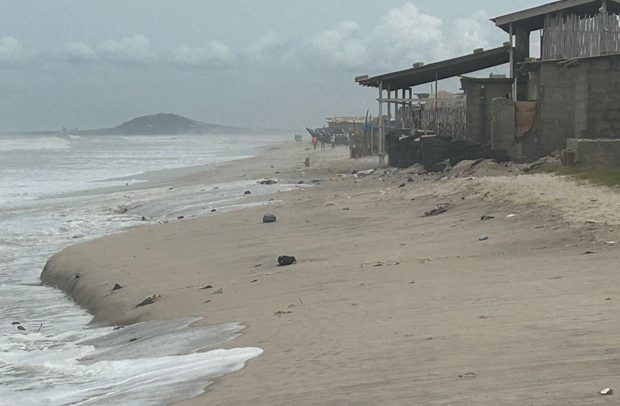
The sea gets very close to people’s settlements on a regular day. The situation gets worse on a rainy days.
WIABOMAN is a small community located in the Greater Accra Region of Ghana; and is situated south-west of Accra, the country’s capital.
Residents of Wiaboman are mainly fishermen and fishmongers who ply their trade in neighbouring communities as well as other parts of the city, while a few do white-collar jobs in the main townships of the city, as do those who have their own businesses.
Given the rise in urbanisation in recent years, the community has seen the influx of more people from various parts of the country who have traveled far and near into Accra, seeking greener pastures.
This has resulted in an exponential increase in residential apartments and other structures put up for rent in the area.
Displacement of People
Like many communities along the coastal areas in Ghana, there has been the incidence of the displacement of people living close to the sea. This, studies have confirmed, is as a result of a rise in sea levels due to climate change.
People of Wiaboman, have, in recent years, seen the sea invade their homes and business centers while they look on helplessly.
In an interaction with some residents, they said although similar events have happened in the past, these only happened once in a long while. However, the frequency with which these do occur in recent times is unprecedented.
Government Interventions
Aware of the severity of this phenomenon, successive governments, have invested heavily in providing some solutions to it, with the chief intervention being the sea defence wall project.
Indeed, this intervention has proved helpful in reducing the rate at which the sea wades into settlements nearer the shore, thus reducing the frequency of displacements in such communities.
However, there are still some communities which are yet to fully benefit from the sea defence wall initiative and Wiaboman is one of such communities.
Impact On Wiaboman
Some parts of the community’s coastline have a well-fitted sea defence wall in place, so high that one would not even see the sea from ground level.
In sharp contrast, one can see on the other side, the sea in all its might and beauty – due to the lack of a sea defence wall there.
Residents in this part of town have had to remain in a constant state of alertness at all times.
Their woes are exacerbated by the fact that the rainy season has started, and given the irregularity of the rain patterns – which is also due to climate change – residents are left at the mercy of the rains and sea.
As a city on its own – with its own ‘supermarkets’ and ‘malls’; hotels and guesthouses; night clubs and others – life in Wiaboman comes to a halt whenever the sea decides to pay a visit through the unwalled parts – which is usually an unwelcome one. Also, anytime it rains heavily, the town gets flooded.
It was discovered, on a visit to that community, that there were no proper drainage systems for those living close to the sea and as such, after the rains have stopped and the sea water has receded, large amounts of water are still left in people’s homes and compounds for days and weeks.
It was also discovered that a number of buildings under construction, were left unattended to, and have been engulfed by water.
Residents’ Concerns
As to whether or not residents would like to leave the place for better places in other parts of the city, most of the residents have been silent on this by refusing to grant interviews except a few.
“We have been living here for quite a long time now. Over here, the rent is cheaper than in other parts of Accra. Accommodation in Accra is very expensive and given the current economic conditions we find ourselves in, it is difficult to think of leaving here”, shares Sam Allotey, a resident.
According to a few residents who agreed to grant interviews on condition of anonymity, they said they would rather choose to live in the same area, even with the sea entering their homes which comes occasionally, than to pay exorbitantly for accommodation elsewhere.
Rising Sea Levels
According to studies, “rising sea levels are due to a combination of melt water from glaciers and ice sheets and thermal expansion of seawater as it warms.”
Ghana has no ice on its seas or anywhere on its marine landscape. However, it is suffering dearly, from the severe impact of climate change in many ways.
The cost of the sea defence wall project runs into hundreds of millions of United States dollars (US$) and government is saddled with the responsibility of providing the funds for this all-important project.
While the residents of Wiaboman and other coastal communities of Ghana, which suffer same fate continue to pray for clear weather at all times, efforts must be made by all stakeholders to deal with, and curb the continuing menace of sea water gushing into communities once and for all.
This report is produced in fulfillment of the UNESCO and CIJ London Climate Change in News Media project facilitated by the Centre for Journalism Innovation and Development (CJID).
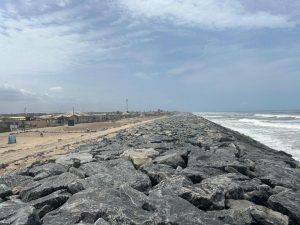
The sea defence wall between the sea and people’s homes on one part of Wiaboman.
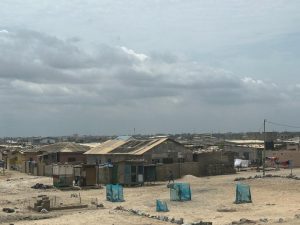
A view of Wiaboman from the top of the sea defence wall.
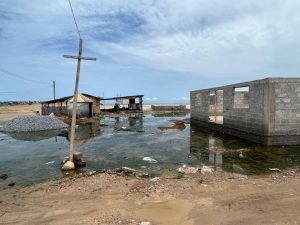
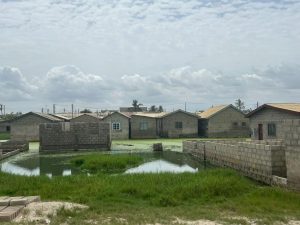
A combination of rain and sea water engulf people’s homes for days and weeks in Wiaboman.
Source: Daily Guide




